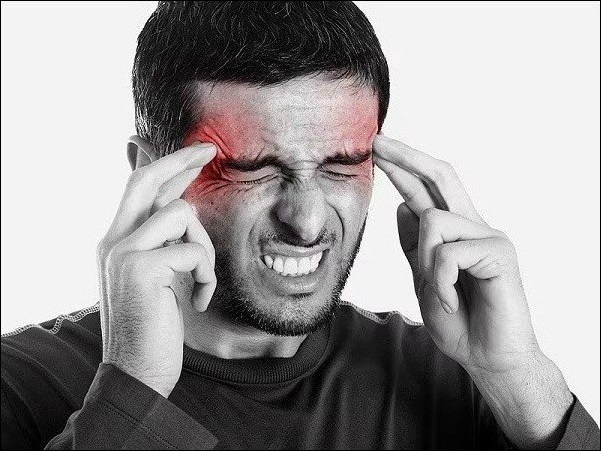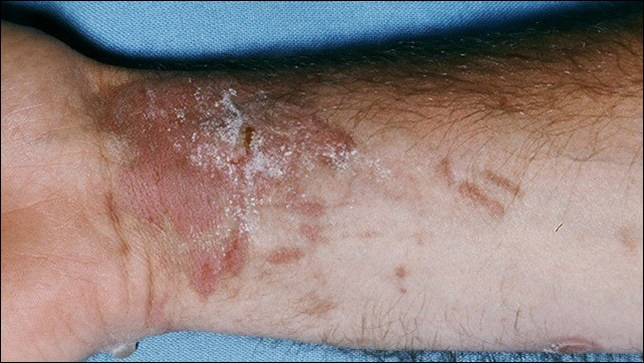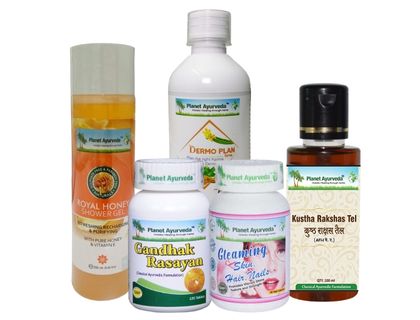Leptomeningeal Enhancement Symptoms And Treatment By Ayurveda
Abstract
Meninges are the membranes that envelop and protect the brain and spinal cord. These meninges are the dura mater, arachnoid mater, and pia mater. The main function of the meninges is to protect the CNS (central nervous system). Sometimes there are conditions that these meninges become inflamed or increase in size due to major infections and other serious issues. The increase in the size of these meninges is known as a leptomeningeal enhancement. In the text below, we shall discuss this condition in detail and see its management in the contemporary system of medicine as well as in the traditional system of Ayurvedic medicine. Let’s see !!

Introduction
The increase in the brain surface is called pial or pial-arachnoid enhancement and is generally known as a leptomeningeal enhancement. Thin arachnoid film is connected or attached to the inner surface of the dura mater, the pachymeningeal pattern of enhancement can likewise be depicted as a dural-arachnoid enhancement. This enhancement can be due to a number of conditions from infection to tumour. Therefore, the management is needed as soon as leptomeningeal enhancement is detected. Sometimes the patient may be asymptomatic and and sometimes associated with non specific neurological deficits. The conditions can be related to the tridosha imbalance in Ayurvedic context. Now let’s see the causes, classification, features, management and ayurvedic aspect of the condition.
Causes of Leptomeningeal enhancement
- Amoebic meningoencephalitis
- Encephalitis
- Granulomatous conditions
- Haemorrhage
- Tumours/cancers
- Post operative infection
- Leptomeningeal carcinomatosis
- Vasculitis
- Neurosarcoidosis
- Neurosyphilis
- Sturge-Weber syndrome etc
Signs and symptoms
- Nausea and vomiting
- Headaches
- Dizziness
- Double vision
- Difficult speaking
- Swallowing difficulty
- Pain in arms and legs
- Loss of bladder and bowel control
- Seizures
- Weakness
- Slack of coordination in the arms and legs
- Fever
- Hearing loss
- Back pain
Investigations
- Lumbar puncture
- CT Scan
- Magnetic Resonance Imaging (MRI)
Management of Leptomeningeal enhancement
- Radiation
- Intrathecal-thecal chemotherapy
- Immunotherapy
- Antineoplastic agents
- Tyrosine kinase inhibitors
- Antimetabolites
- Surgical intervention
Ayurvedic aspect and management of Leptomeningeal Enhancement
Ayurveda, the old age science continuously helps mankind with its marvellous results. Ayurveda revolves around the three basic principles or dosha which are vata, pitta and kapha. There are seven dhatus as well. Any kind of vitiation in these doshas and dhatus results in disease and within normal range leads to a healthy body, mind and soul. The condition of Leptomeningeal enhancement which we are discussing can not be correlated directly to any disease mentioned in the ayurvedic texts but according to the symptoms, and findings this can ideally find its place in the disorders referred to as tridoshaja roga.
Let’s understand how the three dosha are involved in this disease. As the condition can be due to many causative factors which results in enhancement of the meninges. Therefore, the enhancement is the features of vitiated kapha dosha. Further if the condition is due to inflammation caused by infectious agents then this comes out to be a condition due to pitta dosha dominance. And the features such as diplopia, seizures and other neurological features are related to the vitiated vata dosha. Every case of this disease has all the tridosha vitiation and hence regarded as tridoshaja vyadhi. And features of the conditions depend on the dosha predominance.
There are many herbs that are effective correcting the vitiated dosha such as bilva (Aegle marmelos), patla (Stereospermum suaveolens), gambhari (Gmelina arborea), amla (Embelica officinalis), bibhitaki (Terminalia billerica), haritaki (Terminalia chebula), pippali (Piper longum), kachnaar (Bauhinia variegata), prishniparni (Uraria picta), yashtimadhu (Glycyrrhiza glabra), ashwagandha (Withania somnifera), brahmi (Bacopa monnieri), guduchi (Tinospora cordifolia), haridra (Curcuma longa),ginger (Zingiber officinale), marich (Piper nigrum), musli (Chlorophytum borivilianum) and various others.
Kanchnaar guggul, Ras Sindur, Haridra khand, Ashwagandha ghan vati, Chandraprabha vati, Shallaki and various other formulations are available that are effective in managing the condition of Leptomeningeal enhancement.
Herbal Remedies for Leptomeningeal enhancement by Planet Ayurveda
Planet Ayurveda is an eminent GMP certified, ISO 9001:2015 certified and US-FDA registered Ayurvedic Company, which adheres to the objective of manufacturing quality Ayurvedic products as mentioned in a number of ancient texts of Ayurveda. Formulations are manufactured without additives and preservatives and other kinds of chemicals or artificial flavouring agents which can have a number of side effects on the human body. Products manufactured at Planet Ayurveda are pure and devoid of any kind of adulteration. The products are purely organic, vegetarian, gluten free and halal certified. Planet Ayurveda presents its product that effectively manages the condition of Leptomeningeal enhancement.
Following is the list of formulations that are helpful in managing Leptomeningeal Enhancement
Product List
- Neurogenie Capsules
- Yogendra Ras
- Pitta Balance
- Kanchnaar Guggul
- Boswellia Curcumin
- Neuro Plan Syrup
- Musli Strenght Capsules
- Vikramprash

Product Description
1. Neurogenie Capsules
Neurogenie capsules are composed of the herbs which are medhya and promote and improve neurological functions as mentioned in the Ayurvedic texts. The formulation is filled with the properties of herbs brahmi (Bacopa monnieri) and ashwagandha (Withania somnifera). As these are beneficial in promoting muscle health and nerve conduction and their coordination. The herbs in the formulation are vata pacifiers therefore manage the disorders of vata vitiation and restrict and reverse the abnormal growth of the meninges and support the healthy nervous tissue. With these properties, Neurogenie capsules help in Leptomeningeal enhancement.
Dosage : One capsule twice a day with plain water after meals.
2. Yogendra Ras
Yogendra Ras is a classical Ayurvedic formulation. It is a mineral formulation which is helpful in various health conditions. It is composed of loha bhasma (iron calx), shuddha parada (purified mercury), gandhak (purified sulphur), ras sindoor, vanga bhasma (tin calx), shuddha mukta (purified pearls), swarna bhasma (gold calx) and abhrak bhasma (purified silica). Yogendra Ras increases the efficacy of other medicines when taken along with it. Yogendra Ras provides strength to the nerves and muscle and helps in good nervous tissue and health. Therefore, Yogendra Ras is beneficial in Leptomeningeal enhancement.
Dosage : One tablet twice a day.
3. Pitta Balance
Pitta balance is a product of Planet Ayurveda that balances the pitta dosha. It is a herbomineral formulation which contains jaharMohra, kaharawa, akik, mukta, giloy satva (Tinospora cordifolia). As it manages the pitta vitiation, thus helps in symptoms associated with vitiated pitta. It reduces the inflammation thus helps in Leptomeningeal enhancement.
Dosage : One capsule twice a day with plain water after meals.
4. Kanchnaar Guggul
Kanchnaar guggul is beneficial in Leptomeningeal enhancement as it reduces the size of the abnormal enhancement of the meninges. It contains the herbs that are known to reduce the abnormal sizes of the tissues and reduce pain. Ingredients of the formulation include kachnar bark (Bauhinia variegata), amalaki (Emblica officinale), haritaki (Terminalia chebula), bibhitaki (Terminalia billerica), ginger (Zingiber officinale), marich (Piper nigrum), pippali (Piper longum), varuna bark (Crataeva religiosa), tejapatra (Cinnamomum tamala), guggul (Commiphora mukul) etc. The formulation reduces the size of the neoplastic type of Leptomeningeal enhancement. Thus it is a magical formulation that Ayurveda has in uncontrolled and abnormal tissue growths.
Dosage : Two tablets twice a day with lukewarm water.
5. Boswellia Curcumin
Boswellia Curcumin is a product of Planet Ayurveda which is enriched with the goodness of shallaki (Boswellia aristata) and haridra (Curcuma longa). The herbs have healing properties and also possess analgesic effects which makes it an effective formulation in the Leptomeningeal enhancement. It regresses the inflammation, heals the damaged tissue and also alleviates the pain and reduces the abnormal size or enhancement of the meninges.
Dosage : One capsule twice a day.
6. Neuro Plan Syrup
Neuro Plan Syrup is a remarkable formulation for increasing neurological health and managing all the neurological conditions. The syrup contains a variety of herbs which assuredly manages Leptomeningeal enhancement . The syrup is enriched with the properties of mandukaparni (Centella asiatica), jyotishmati (Celastrus paniculata), madhuyashti (Glycyrrhiza glabra), pippali (Piper longum), maricha (Piper nigrum), ashwagandha (Withania somnifera), shankhpushpi (Convolvulus pluricaulis), brahmi (Bacopa monnieri) etc. All the herbs are known to have medhya properties which means these are helpful in maintaining a good neurological health. The herbs heal the damage of the nerves. It improves motor function. It relieves symptoms of vitiated vata dosha. Therefore, by pacifying the vata dosha, it helps in alleviating the seizure-like symptoms of Leptomeningeal enhancement.
Dosage : Two tsp twice a day.
7. Musli Strength Capsules
Musli Strength Capsules are enriched with properties of gokshura (Tribulus terrestris) and safed musli (Chlorophytum borivilianum). Both the herbs pacify vata dosha. As the name suggests Musli Strength Capsules strengthens the muscles and improves neurological health. The capsules help in the neoplastic condition of the nervous tissues and heals the damaged neurons. Therefore, Musli Strength Capsules are helpful in managing Leptomeningeal enhancement.
Dosage : One capsule twice a day.
8. Vikramprash
Vikramprash is a preparation of Planet Ayurveda which is available in jam form. Vikramprash is filled with the herbal properties of Bilva (Aegle marmelos), Agnimantha (Premna mucronata), Syonak (Oroxylum indicum), Patla (Stereospermum suaveolens), Pippali (Piper longum), Gokshura (Tribulus terrestris), Jivanti (Leptadenia reticulata), Utpal (Nymphaea alba), Musta (Cyperus rotundus) and many other herbs. Drugs that are present in the formulation promotes the wellbeing of a person because it maintains the dosha levels within normal limits. Antioxidants present in the medicine slow down the ageing process because it is rich in nutrients that rejuvenates body cells. Being fulfilled with the properties of rasayana, Vikramprash helps in boosting immunity that further benefits in disorders of autoimmune, age related and neoplastic origin. With amazing and tridosha balancing properties, Vikramprash helps in management of Leptomeningeal enhancement.
Dosage : One spoon daily
CONTACT PLANET AYURVEDA TO PROVIDE YOU WITH THE COSTING / ORDERING AND DELIVERY INFORMATION AT – COSTING.PLANETAYURVEDA@GMAIL.COM OR CALL AT +91-172-5214040
Conclusion
As we discussed Leptomeningeal enhancement, we have come to know that leptomeningeal enhancement is an abnormal growth or enhancement of the meninges that can occur due to a number of factors including infections, tumours, encephalitis, granulomatous conditions, haemorrhage etc. Leptomeningeal enhancement may stay asymptomatic in some cases but in some cases it may lead to a number of troublesome features. In the modern system of medicine, there is no proper management available but chemotherapy and radiation therapy are some of the main management therapies that are performed which does not provide positive effects efficiently but causes a number of side effects which can hamper other functions of the body. Whereas Ayurvedic management is based on correcting the dosha imbalance that causes the disorder and also manages the symptoms impeccably. Further herbs are available that beautifully contain the symptoms and disease to the maximum. Hence, preferring Ayurveda over the side effect causing therapies will eventually provide promising results.



